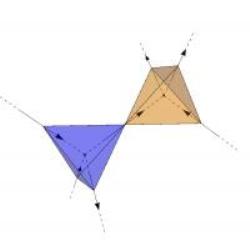When bar magnets with north and south magnetic poles are sawed in half, the resultant pieces of the magnet also possesses a north and a south pole. Magnetic monopoles were not possible. However, recently, monopoles in the form of "quasiparticles" have been demonstrated in laboratories. These particles are the collective excitations that occur among many atoms.
 The unit cell for "spin ice" materials consists of two tetrahedrons. The arrows show the orientation of the magnetic atoms within the material. Credit: Stephen Powell
The unit cell for "spin ice" materials consists of two tetrahedrons. The arrows show the orientation of the magnetic atoms within the material. Credit: Stephen Powell
A scientist belonging to the University of Maryland and the Joint Quantum Institute (JQI), Stephen Powell, stated that creating 'magnetricity' or the magnetic equivalent of AC electricity may be possible, while it was not possible to achieve steady flows of magnetic monopoles. 'Magnetricity' may be used for novel types of high-density data storage.
Magnetic and electric forces possess a great symmetry, but isolated magnetic "charges" do not exhibit this symmetry. Electrons, which are a form of isolated electric charges, do exist. Positive charges and negative charges can combine to form neutral electric dipoles. In magnetism, dipoles could be created but not monopoles . Quasiparticles produced through the fractional quantum Hall effect may hold the possibility for magnetic dipoles which may be fractional or isolated.
"Spin ice," which is composed of dysprosium (Dy), titanium and oxygen, holds the possibility for isolated magnetic poles. This material consists of tetrahedral groupings, which consist of two Dy atoms which point out of each tetrahedron and two Dy atoms which point in. Each Dy acts like an individual tiny dipole magnet.
Among magnetic atoms, at low temperatures of around 5 K, a state of "frustration" occurs. A disordered state that has synchronized and strong fluctuations exists. In this state, unpaired magnetic poles may form. Quasiparticle excitations exist in spin ice. These possess a net magnetic "charge" which enables mobility. An analogous tenuous cloud of magnetic charges may be formed and this is considered as "monopole plasma."
Powell showed the confinement of monopoles into magnetically neutral dipoles. The scientist has prescribed the transition of the monopole phase into the pole-confined phase. He has addressed the universality with regard to the freezing process which occurs at super-low temperatures, during which period the monopoles in spin ice fall back into dipoles.
The study has been published in the journal Physical Review Letters.